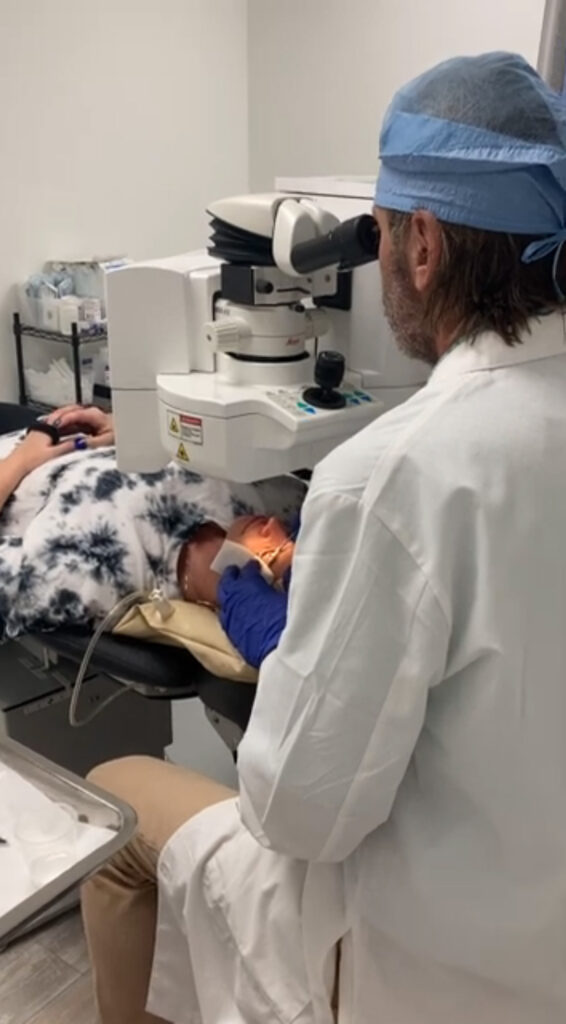LASER VISION CORRECTION
USING PRK SURGERY
What is PRK?
PRK (photorefractive keratectomy) is a type of refractive surgery that is used to correct nearsightedness, farsightedness, and astigmatism. Unlike LASIK surgery, which involves creating a flap in the cornea, PRK surgery involves removing the outer layer of the cornea, called the epithelium, with a specialized brush or laser.
After the epithelium is removed, an excimer laser is used to reshape the cornea to correct the patient’s vision. The laser uses a computer-controlled beam of cool ultraviolet light to remove microscopic amounts of tissue from the cornea, in a pattern determined by the surgeon.
The surgery usually takes about 10-15 minutes per eye and is performed under local anesthesia. After the procedure, a bandage contact lens is placed on the eye to protect the cornea while it heals. The patient will need to use antibiotic and anti-inflammatory eye drops for several days or weeks after the surgery to prevent infection and reduce inflammation.
The recovery time for PRK surgery for our Sebastian area patients is longer than LASIK surgery because the epithelium takes several days to grow back. During this time, the patient may experience some discomfort, sensitivity to light, and blurry vision. It can take several weeks or even months for the full effects of the surgery to be realized, and the patient may need to wear glasses or contact lenses during this time. However, once the healing process is complete, many patients achieve improved vision without the need for corrective lenses.

PRK vs. LASIK
There are several potential benefits of PRK (photorefractive keratectomy) surgery for Sebastian, FL patients:
Effective for correcting vision: Our PRK surgery in Sebastian and Okeechobee has been shown to be highly effective at correcting nearsightedness, farsightedness, and astigmatism. Many patients who undergo PRK experience significant improvements in their vision and are able to reduce their dependence on glasses or contact lenses.
No need for corneal flap: PRK does not involve creating a corneal flap, which is a key difference from LASIK surgery. This means that there is no risk of flap-related complications such as flap dislocation, flap-related infections, or complications with flap healing.
Suitable for patients with thin corneas: PRK may be a better option for patients with thin corneas or other corneal irregularities that make them unsuitable candidates for LASIK surgery.
Safer for certain occupations: Some occupations, such as military personnel, athletes, or law enforcement officers, may require avoiding LASIK surgery due to concerns over flap dislocation or other potential complications. PRK may be a safer option for these individuals.
Minimal long-term risks: The long-term risks associated with our photorefractive keratectomy surgery in Sebastian and Okeechobee is minimal, with most patients experiencing only minor side effects such as dry eyes, glare, and halos, which usually improve over time.
It is important to note, however, that not all patients in Sebastian, FL are candidates for PRK surgery, and each patient’s individual circumstances and medical history should be evaluated before deciding on the best course of treatment.
After the epithelium is removed, an excimer laser is used to reshape the cornea to correct the patient’s vision. The laser uses a computer-controlled beam of cool ultraviolet light to remove microscopic amounts of tissue from the cornea, in a pattern determined by the surgeon.
The surgery usually takes about 10-15 minutes per eye and is performed under local anesthesia. After the procedure, a bandage contact lens is placed on the eye to protect the cornea while it heals. The patient will need to use antibiotic and anti-inflammatory eye drops for several days or weeks after the surgery to prevent infection and reduce inflammation.
The recovery time for our PRK surgery patients in Sebastian, FL is longer than LASIK surgery because the epithelium takes several days to grow back. During this time, the patient may experience some discomfort, sensitivity to light, and blurry vision. It can take several weeks or even months for the full effects of the surgery to be realized, and the patient may need to wear glasses or contact lenses during this time. However, once the healing process is complete, many patients achieve improved vision without the need for corrective lenses.
Am I a candidate for laser vision correction using PRK surgery?
PRK (photorefractive keratectomy) surgery may be an option for Sebastian, FL area individuals who meet the following criteria:
Have stable vision: Sebastian, FL candidates for PRK surgery should have stable vision for at least 12-24 months prior to the surgery. This ensures that the vision correction achieved through the surgery will be long-lasting.
Are at least 18 years old: The FDA has approved PRK for patients who are 18 years or older. This is because the eyes are still changing in younger individuals, and their vision may not be stable enough for surgery.
Have healthy eyes: Candidates for PRK should have healthy eyes with no underlying conditions that could affect the healing process. Conditions such as glaucoma, cataracts, or severe dry eye may disqualify a patient from undergoing PRK surgery.
Have suitable corneal thickness: PRK involves removing the outer layer of the cornea, so candidates should have sufficient corneal thickness to safely undergo the surgery. Patients with thin corneas may not be suitable candidates for PRK and may need to consider alternative options such as implantable contact lenses.
Have realistic expectations: It is important that candidates for PRK (photorefractive keratectomy) surgery in Sebastian and Okeechobee have realistic expectations about the outcomes of the surgery. While PRK is highly effective at correcting vision, it is not a guaranteed “perfect vision” solution, and some patients may still require glasses or contact lenses following the surgery.
Are not pregnant or nursing: Women who are pregnant or nursing should postpone PRK surgery until after they have completed breastfeeding and their hormones have stabilized.
It is important to note that each patient’s individual circumstances and medical history should be evaluated by Dr. Zudans to determine whether PRK is a suitable option for them.












